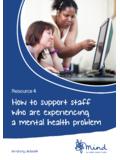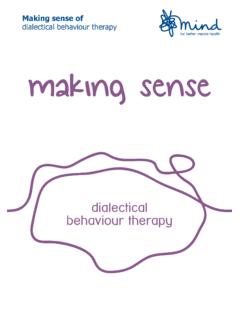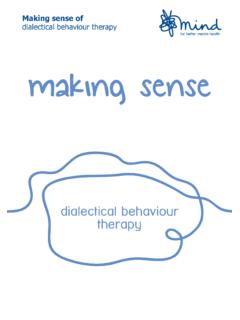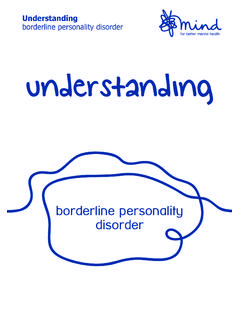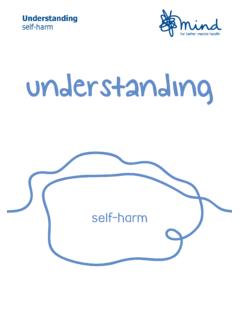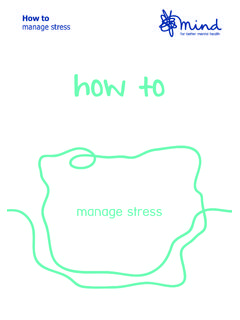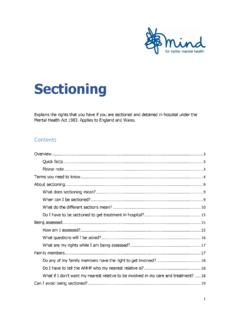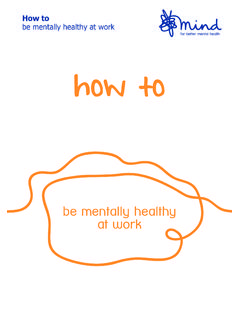Transcription of Psychiatric medication - Mind
1 Mind 2021 1 Psychiatric medication Explains what Psychiatric drugs are, what to know before taking them, and information on side effects and coming off medication . If you require this information in Word document format for compatibility with screen readers, please email: Contents What is Psychiatric medication ? .. 2 Why do some medications have different names? .. 4 What do I need to know before I take medication ?.. 5 How do I know if a drug is right for me? .. 6 Could I ever be forced to take medication ? .. 6 Accessing Psychiatric medication .. 7 Where can I buy medication online? .. 9 Side effects of Psychiatric medication ..10 What is the Yellow Card scheme? ..12 What if I want to stop taking my medication ? ..13 What is a drug's half-life? ..14 Mind 2021 2 What is Psychiatric medication ? Psychiatric medication includes all drugs which can be prescribed to: treat different types of mental health problem reduce the symptoms of mental health problems prevent the return of mental health problems and their symptoms (also known as relapse).
2 This page has information on: What types of Psychiatric medication are there? Will I be offered medication for my mental health? How long might I need to take medication for? Where can I find out more about Psychiatric medication ? What types of Psychiatric medication are there? The main types of Psychiatric medication are: antidepressants antipsychotics sleeping pills and minor tranquillisers lithium and other mood stabilisers. Antidepressants Antidepressants are usually prescribed to help with moderate or severe depression. This may include experiencing depression as part of another mental health problem. You might also be offered antidepressants if you experience anxiety, obsessive-compulsive disorder (OCD) or eating problems. See our pages on antidepressants for more information, including our A to Z list of antidepressant medications.
3 Antipsychotics Antipsychotics may be prescribed to reduce the symptoms of: psychosis schizophrenia Mind 2021 3 schizoaffective disorder severe anxiety, in some cases. They are sometimes also prescribed if you are experiencing bipolar disorder. This is because they can help control hypomania and mania. See our pages on antipsychotics for more information, including our A to Z list of antipsychotic medications. Sleeping pills and minor tranquillisers These drugs may be prescribed to help you sleep if you experience severe insomnia (difficulty getting to sleep or staying asleep). Or you may be offered them if you experience severe anxiety, to help you feel calm. You may hear them called anti-anxiety drugs if they are used to help with anxiety. See our pages on sleeping pills and minor tranquillisers for more information, including our A to Z list of sleeping pills and minor tranquillisers.
4 Lithium and other mood stabilisers These drugs can help stabilise your mood if you experience extreme mood swings. For example, you may be offered them if you are diagnosed with bipolar disorder. If you take them for a longer period, they can also reduce the risk of symptoms returning in future. These drugs may also be prescribed for hypomania and mania. Or they may be offered for some cases of severe depression or schizoaffective disorder. See our pages on lithium and other mood stabilisers for more information. Will I be offered medication for my mental health? Whether or not you are offered medication for your mental health is likely to depend on: what mental health problems you are diagnosed with what your symptoms are how severely your mental health problem affects you. There are many different types of mental health treatment to help you cope with your symptoms.
5 You may be offered other treatments instead of medication . Or you may be prescribed medication at the same time as another treatment, such as a talking therapy. How long might I need to take medication for? Mind 2021 4 This depends on what mental health problems you experience, and how severely they affect your life. For some mental health problems, you might only take medication for a short, specific period of time. For example, this may be to help with an episode of psychosis or if you have difficulty sleeping. For other problems, you might take medication for a longer period. This could be if you have repeated problems with your mental health. Or if there is a significant risk that your symptoms will return if you stop taking medication . For example, you may take medication for a longer period if you are diagnosed with schizophrenia or bipolar disorder.
6 Your GP or psychiatrist should regularly review your treatment with you. They should do this even if you have taken medication for a long time. This is to make sure it is still the best option for you. Where can I find out more about Psychiatric medication ? Anyone who prescribes you medication should be able to give you information about your treatment. Your pharmacist can also provide lots of information about medication . These websites allow you to search for detailed information about a specific medication : NHS medicines A to Z British National Formulary (BNF) drugs information electronic medicines compendium (eMC) Medicines and Healthcare products Regulatory Agency (MHRA) products search Why do some medications have different names? Any individual medication can have two kinds of name: A generic name. This is the drug's medical name, describing the active chemical in the drug.
7 There will only be one generic name for a specific drug. A trade or brand name. These are names given to a drug by companies which manufacture the drug. Individual drugs can have several different trade names. For example, the antidepressant with the generic name fluoxetine is also known by the trade names Olena, Oxactin, Prozac and Prozep. These are all names for the same medicine, containing the same active ingredient. Whatever medication you are taking, it is useful to know the generic and trade names for a certain drug. This is because different people might refer to the same drug using different names. Mind 2021 5 What do I need to know before I take medication ? Before deciding to take any drug, it helps to have all the information you need to make an informed choice. As a start, you could use the following list of statements and see if you can answer 'yes' to all of them.
8 I understand: what the drug is why I have been offered it what other treatment and support options are available, such as talking therapies, peer support and complementary and alternative therapies what the possible benefits and risks of taking medication are what the possible side effects are and how likely I am to develop them how, when and how much of the medication I may need to take how long I may need to take the medication before it begins working how long I might need to continue taking the medication for. For example, if it is for a few days or weeks, or for a longer period how to store the medication safely, such as in a fridge how to stop taking the medication safely what different names the drug might be called what to do if my medication runs out. See our page on accessing medication for more information.
9 I have: checked the ingredients list and know that there's nothing in the drug that I'm allergic to, intolerant of, or don't want to take. For example, some drugs contain lactose or gelatin read the Patient Information Leaflet (PIL) that comes in the drug packet, and understand the information it has about my medication . Our A to Z of Psychiatric medication has links to download PILs for different Psychiatric drugs. I have told my doctor if I: take any other medication , including non-prescription medicines have any other physical or mental health problems am pregnant or breastfeeding , or planning to get pregnant in the future Mind 2021 6 have any previous experiences of Psychiatric medication . For example, this may include what I took, what worked and what didn't, and any side effects I experienced. If you are unsure about any of these details, you can talk to your doctor or pharmacist.
10 If this feels like it might be a difficult conversation, our page on talking to your GP may help. How do I know if a drug is right for me? Medications can work in different ways for different people. It s not always possible to predict exactly which drug will suit you. But there are things you can do to help find the medication that works for best you: Review your medication regularly. Your doctor or psychiatrist should give you a regular chance to talk about how you are getting on with your medication . For example, they should ask how you are feeling and whether the medication is helping. You can also discuss whether you are experiencing any side effects. Discuss any problems with your GP or psychiatrist. They might be able to offer you an alternative type of medication or treatment. Or they can advise you about how to manage your medication to reduce any problems.
